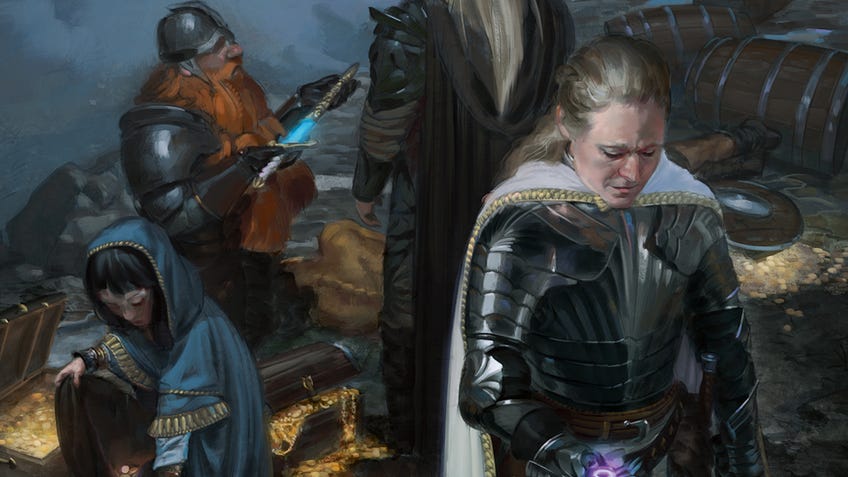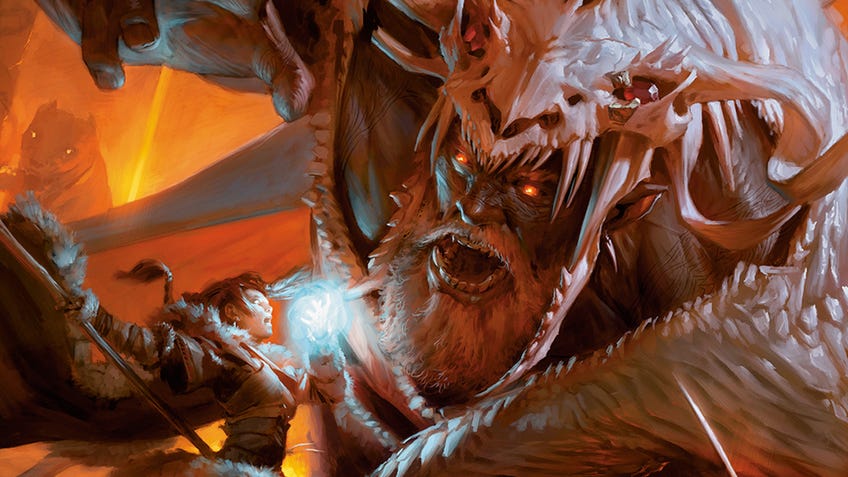D&D and MTG owner’s $1.06 billion loss dwarfs strong performance from Wizards of the Coast
Layoffs, inventory shedding and the sale of its entertainment branch still leave Hasbro leaning hard on its golden geese.
Toy making giant Hasbro reported a $1.06 billion loss for the fourth financial quarter of 2023. CEO Chris Cocks told investors during a February 13th earnings call that the holiday season fared worse than their already belt-tightening predictions, and “the macroeconomic backdrop” forced the corporation into several cost-saving decisions (most notably the layoff of 1,100 employees in mid-December).
Investors were increasingly interested in Hasbro’s one victory - the continued profit posted by Wizards of the Coast, publisher of Dungeons & Dragons and Magic: The Gathering. Wizards (plus digital gaming) raked in $103 million in Q4 and earned $1.07 billion across the entirety of 2023. That’s a lot of zeroes, and both Cocks and Hasbro’s investors were keen to see what other fiscal spells those Wizards might be able to cast in 2024.
First, let’s break down some numbers for Q4: Hasbro’s entertainment sector posted a $1.11 billion loss, mostly from the long-awaited sale of eOne to Lionsgate, while consumer products (Nerf, Play-Doh, etc.) lost $126 million. The corporation additionally ate $130 million in inventory writedown while reducing its existing inventory by half. Essentially, the value of toys and games already produced but not yet sold dropped in value, so Hasbro shed quickly before the situation worsened.
Hasbro’s digital gaming segment, which includes Wizards’ Magic Arena, casino gambling and mobile titles, grew by 7% thanks to the meteoric success of Larian’s Baldur’s Gate 3 and Scopely-produced Monopoly Go! (which is just a mobile version of the classic board game with the usual bucket of monetisation schemes and ads).
Wizards’ traditional tabletop sales is where things get interesting, as the segment earned $266 million in Q4 thanks to the continued success of Lord of the Rings-themed premiere set, Tales of Middle-earth. Despite that 3-5% growth compared to last year, the total segment showed very nearly no growth. As ICv2’s Milton Griepp estimates, this could mean flagging performance from Dungeons & Dragons.
This is to be somewhat expected in the year preceding D&D’s highly-touted 2024 update to the core rulebooks, which will stagger their release dates throughout this year and into 2025. Public outcry over the OGL fiasco in early 2023 and a flaccid performance of feature film Honor Among Thieves certainly didn’t help position the brand for easy success.

Cocks and Hasbro CFO Gina Goetter formed a united front in reassuring investors that Wizards of the Coast’s two consistently performing brands would continue their climb up the neverending profitability ladder. Magic: The Gathering will double down on IP crossover events by releasing two Universes Beyond premiere sets per year starting in 2025 (Tales of Middle-earth amassed $200 million in six months, causing dollar signs to erupt from the collective eyeballs), while Dungeons & Dragons’ online future increasingly seems tied to outside media - Cocks specifically mentioned a “robust entertainment slate”, more licensed video games in the future and “Universes Beyond-style content” in the D&D beyond marketplace.
These investor calls often mean listening to surreal questions juxtaposing EBITDA and amortisation against Peppa Pig and Transformers, but everyone showed a keen and almost hungry interest in Wizards of the Coast’s potential. So, it’s worth thinking about the realities facing both D&D and MTG. Cocks promised one new digital game using the D&D brand in 2026 with another one or two per year beginning in 2027, yet Hasbro-partnered Hidden Path Entertainment just laid off most of its staff and indefinitely shelved development on its licensed RPG. We don’t know the state of any of Hasbro’s other projects, and Baldur’s Gate 3 took six years to make - any plan hanging on consistent hits of that scale is pure folly.
Meanwhile, MTG’s success should be contrasted against mounting product fatigue within enfranchised players and a suddenly crowded playground now that Disney Lorcana and the fast-approaching Star Wars Unlimited TCGs are fighting for player’s dollars and attention. When asked about repositioning MTG as a collectible instead of a competitive game, Cocks said that Universes Beyond sets such as Tales of Middle-earth proved hugely successful at capturing new players. 2025’s Final Fantasy premiere set, followed shortly by several Marvel-themed releases, will both likely do the same.
As I mentioned in the Dicebreaker Slack, it feels as though Hasbro is grasping tight to the rock that is Wizards of the Coast, poised to collect as much blood as possible in order to firm up their shaky financial position. But if this year has been any indication, no amount of brand maximising and full-throated embracing of collectibility over gameplay (not to mention brutal staff cuts) can redeem Hasbro’ stock price. But that won’t stop the C-suite from squeezing.

